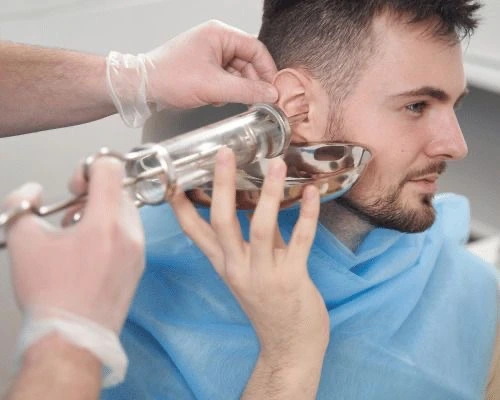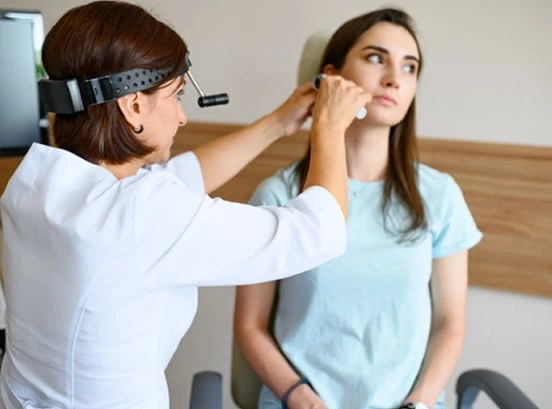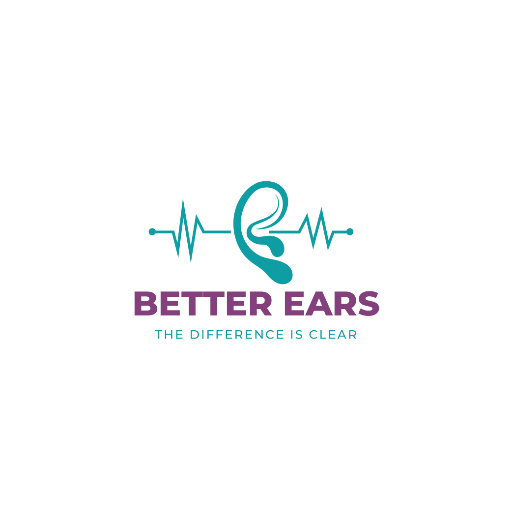
Have you ever felt like your ears are blocked, muffled, or full — even though nothing seems obviously wrong? That annoying “full” sensation in your ears might seem harmless, but it could be a sign your body is trying to tell you something. Whether it comes and goes or stays constant, it’s important to understand what’s happening behind the scenes.
In this blog, we’ll explore the common and hidden ear fullness causes, how to differentiate between temporary discomfort and serious symptoms, and what you can do to protect your ear health.
What Is Ear Fullness?
“Ear fullness” refers to a feeling of pressure, blockage, or congestion in the ears. Some people describe it as feeling like you’re underwater or that your ears haven’t “popped” after a flight. While it’s often associated with earwax, there are many other potential reasons — some of which need medical attention.
Top 7 Causes of a Full Feeling in the Ears
1. Earwax Buildup
The most common and easily treatable cause. When earwax accumulates, it can block the ear canal, causing a pressure-like feeling and even temporary hearing loss.
What to do: Avoid cotton buds. Book a professional microsuction cleaning session instead.
2. Eustachian Tube Dysfunction
This narrow tube connects your middle ear to the back of your nose and throat. When it gets blocked due to allergies, sinus infections, or even altitude changes, it can lead to ear fullness.
Symptoms: Popping sensation, muffled hearing, or imbalance
When to see a professional: If it lasts more than a week or interferes with daily activities.
3. Middle Ear Infections
Infections in the middle ear (also called otitis media) can cause fluid buildup and pressure. This is especially common in children but also affects adults.
Watch out for: Fever, sharp ear pain, or fluid drainage from the ear.
4. TMJ Disorders
Your jaw joint is closely connected to your ear structure. If you grind your teeth or have jaw tension, you might feel ear pressure or fullness.
Common signs: Jaw clicking, difficulty chewing, or facial pain.
5. Barotrauma
Sudden changes in altitude (flying, diving, or mountain travel) can disrupt ear pressure and lead to barotrauma — damage due to pressure imbalance.
Who’s at risk: Frequent flyers, divers, and people with sinus issues.
6. Meniere’s Disease
A chronic condition of the inner ear that affects balance and hearing. One of its early symptoms is a sensation of ear fullness, often accompanied by dizziness.
Other symptoms: Ringing (tinnitus), vertigo, and hearing loss.
7. Acoustic Neuroma (Rare but Serious)
This is a non-cancerous tumor on the nerve that connects the ear to the brain. Though rare, it can present as one-sided fullness, tinnitus, or hearing loss.
Seek immediate medical help if symptoms persist or worsen over time.

When Is Ear Fullness a Warning Sign?
Ear fullness that persists for more than a few days, comes with other symptoms (like pain, dizziness, or ringing), or affects only one ear could be a red flag. Ignoring it may lead to complications or missed early diagnosis of serious conditions.
Diagnosis: What to Expect
If you’re experiencing a persistent full feeling in your ear, a hearing health professional or ENT might conduct:
- Otoscopy (visual exam of the ear canal)
- Hearing tests
- Tympanometry (measuring eardrum pressure)
- Imaging tests in rare cases
Why DIY Methods Can Make It Worse
Let’s face it — we’ve all been tempted to “fix” the problem ourselves using:
- Cotton buds
- Oils
- Candling
- Water syringes
These methods might offer temporary relief but often push the wax deeper or increase the risk of infection and damage.
Pro tip: Leave it to trained professionals. Microsuction is safe, quick, and doesn’t involve water or pressure.

What You Can Do Right Now
If you’ve been dealing with ear fullness, here’s your plan:
- Stop inserting anything into your ear canal.
- Track your symptoms — Is it one ear or both? Does it come and go?
- Stay hydrated and use steam inhalation if related to sinuses.
- Schedule a professional ear checkup.
Treatment Options
- Professional earwax removal
- Medication (for allergies or infections)
- Surgery (in rare cases, such as blocked Eustachian tubes or tumors)
- Hearing aids or balance therapy (for chronic inner ear disorders)
Prevention Tips
- Avoid over-cleaning your ears.
- Manage allergies and sinus health.
- Use ear protection during flights or underwater activities.
- Address jaw tension or teeth grinding.

Why Choose Better Ears?
At Better Ears, we specialise in safe, gentle, and professional ear care. Whether you’re dealing with blocked ears, discomfort, or chronic fullness, our camera-guided microsuction offers a comfortable and precise solution.
🏠 Home and clinic appointments available
🩺 Led by qualified hearing professionals
📞 Connect at 0770 613 5883 or visit betterears.org to book.
Final Thoughts
Ear fullness can range from mildly annoying to seriously concerning — but you don’t have to live with it. Trust your instincts, listen to your body, and seek expert help when needed.
Ignoring that “full” feeling might seem harmless — but your ears deserve better.
